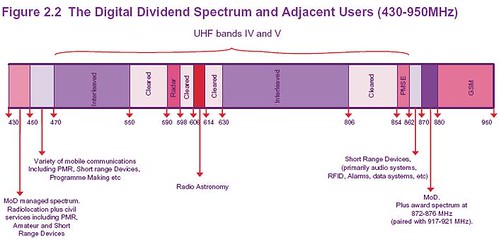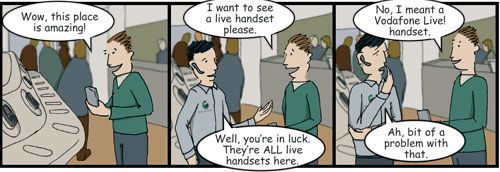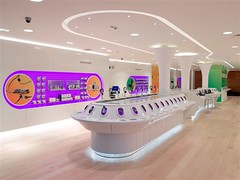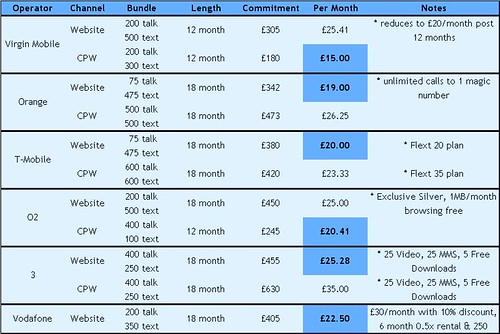The Economist has
a good story this week on the African Mobile Telecoms scene.
I would like to add my two pennies looking at Africa from a few different angles.
Arab Africa should be seen differently
Etisalat shocked the Mobile World when it bought the 3rd licence in Egypt for US$2.8bn. This is a staggering sum given the size of the economy and penetration levels of Egypt and cannot be accounted for by financial means alone. Personally, I see this as a definite case of the Arab investors getting carried away in bidding for Arab Assets. Etisalat is owned by the government of Dubai which also has a link with Tecom Investments who has
just paid US$2.3bn for 35% of Tunisie Telecom.
It is in this context that I laughed when Vodacom mentioned at the recent Vodafone Emerging Markets Day that they planned on bidding for assets in Algeria. Of course, bidding on the privatisation of Algerie Telecom is a tempting proposition; especially given Algeria is the third largest economy in Africa after Egypt and South Africa. But realistically Vodacom have zero chance of winning once the Dubai companies show the size of their wallets and determination to pursue trophy assets.
Other interesting Arab assets that might come up for sale in the medium term (5 years) are:
- Libya – I can’t see this country keeping its borders closed to the international mobile operators for too much longer;
- Morocco – If Vivendi is ever broken up then this would be a very tasty morsel; and
- Somali – If there is even a faint sign of peace breaking out then the international mobile investors will enter the country before the various militias have time to re-arm.
Orascom juggles its assets
Orascom which is controlled by the Egyptian Sawiris Family is an interesting case study.
Orascom jointly owns the #1 operator in Egypt, Mobilnet, with France Telecom. As they became more confident they started to expand where the assets were cheapest which was in sub-saharan Africa. Orascom managed to build up a reasonable portfolio of networks. However from 2003 to 2005, they have pulled out of Gabon, Benin, Togo, Niger, Burkina Faso, Zambia, Burundi, Uganda, Central African Republic, Sierra Leone, Chad, Congo Brazzaville and the Democratic Republic of Congo. They now have remaining a single network in Zimbabwe and that is probably only because no-one will take it off their hands.
Meanwhile in the Arab world they have launched networks in Algeria, Tunisia and Iraq and in the wider Muslim world bought networks in Pakistan and Bangladesh. There has been a set back along the way in Syria and a disposal in Jordan. Additionally, the Sawaris in a personal capacity have bought the Italian operator Wind. It seems to me that the Sawaris have pursued a strategy of replacement of lower-value assets to higher-value assets.
The lesson in all this is that Arab money in sub-Saharan networks may be a temporary phenomenon on the way to international credibility.
Ultra-Aggressive MTC
MTC have been the most aggressive acquirer of sub-saharan networks buying Celtel (Burkina Faso, Chad, DRC, Congo Brazaville, Gabon, Kenya, Malawi, Niger, Sierra Leone, Sudan, Tanzania, Uganda, Zambia) in Mar 2005. However even all of these networks didn’t satisfy the MTC appetite with further acquisitions in Dec 2005 of Madacom of Madagascar, Feb 2006 another 61% Mobitel of Sudan for $1.332bn and in Apr 2006 65% of V-Mobile of Nigeria for $1bn.
MTC has a very aggressive strategy of becoming a global mobile player by 2011. As part of this strategy it expects to establish MTC as a valued brand, therefore it is hardly surprising that they plan to drop the relationship with Vodafone who have partner networks with 100% MTC owned subsidiaries in Kuwait and Bahrain. If fact if I was Vodafone, I be thinking of testing the MTC commitment for sub-saharan Africa by getting Vodacom to put a bid in for adjacent networks in Zambia and Malawi. Personally I think that even with all the oil wealth in Kuwait, MTC will struggle to go global.
Vodacom said they were interested in entering the Nigerian market which is now dominated by three companies: MTC, MTN & Globacom. Globacom is privately held and I’m sure that this is the network that Vodacom is after. However, I don't believe Vodacom will make a move until the next President is in situ - an African country in the midst of a change of government is a tricky situation.
MTN – South African Lebanese Connection
MTN is the largest African mobile company by subscribers and this was before the African mega-acquisition of Investcom for US$5.5bn. The offer was partly in shares (32-36%) which was accepted by the majority shareholders of Investcom - the Lebanese Mikati family. This was an amazing price especially given that Investcom only had 5m subscribers, US$400m of EBITDA and operates in some of the riskiest countries in the world (Ghana, Benin, Liberia, Guinea Bissau, Guinea Republic, Syria, Yemen, Sudan, Afghanistan and Cyprus). MTN justified the price by saying it was buying further growth which is true, but at 14x earnings?
Additionally there is always the risk of some past “problems” crawling out of the woodwork and this appears to be the case in the most valuable asset in Ghana where two
local businessmen are claiming that Investcom stole their ownership from them. This could be quite an expensive mistake as apparently MTN have already made a US$400m provision for losing this case.
I suspect the real reason that MTN need the Mikati’s because they have over-exposed themselves in Iran. Iran is one of biggest potential markets left to be explored in the world, however even the blindest of xenophobes will realize that carries some political risks. There is no doubt that Mikati’s with connections in both Syria and Iran will be able to provide MTN some assistance in this challenging country.
Three Remaining Non-mined Gems
What do Angola, Libya and Ethiopia have in common? They are all mainly closed to non-national mobile investment. When these countries eventually open up, I expect to see a big rush to purchase existing networks and spectrum.
Extracting Value
As I discussed in a previous post on
Telenor and Bangladesh, I think there is going to be a big problem in extracting profits from these relatively poor countries. There is also a huge risk of political and economic stability throughout the continent. The only way to counter this risk is to have a large portfolio – both MTN and MTC are far ahead of the crowd in this respect. Personally, I think the Vodafone African Strategy is currently hopelessly over-exposed to South Africa, Egypt and Kenya. Although, Vodafone seem to have overcame the extraction of value problem in these countries – it adds partner risk to the equation.







